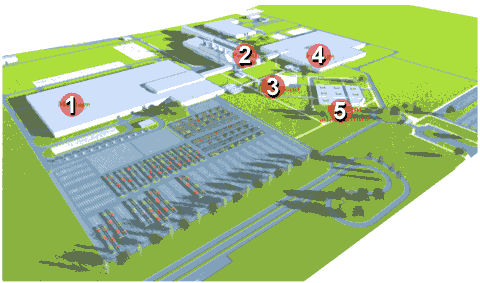
.
. .
..
. . .
© 1998 - 2002 Copyright
& |
.
Peugeot Citroen : New Plant in Brazil
Source : PSA
Paris, Jan. 29, 1999 -- Less than a year after the signing of an agreement by PSA Peugeot CitroŽn and Brazilís Rio de Janeiro state, Jean-Martin Folz, Chairman of PSA Peugeot CitroŽn, and Anthony Garotinho, Governor of Rio de Janeiro state, laid the cornerstone for the Peugeot CitroŽn do Brasil plant in Porto Real (Rio de Janeiro state) at an official ceremony held today. The start of construction on the plant underscores PSA Peugeot CitroŽnís commitment in Brazil. The plant will come on stream in late 2000, producing the CitroŽn Xsara Picasso and the Peugeot 206. The facility will cover 200 hectares and include body-in-white assembly, paint and assembly shops. Total employment is expected to increase gradually to 2,500. The Brazilian unit will expand PSA Peugeot CitroŽnís already sizeable production base in Latin America, which is located mainly in Argentina, where a majority interest was acquired in Sevel last year. With that acquisition, the Group gained control of a plant with annual output of more than 100,000 vehicles. Other production facilities are located in Uruguay and Chile. Construction of the new plant is in line with PSA Peugeot CitroŽnís strategy to expand operations outside Western Europe, with the goal of selling 25% of its vehicles in those regions within the next ten years. The focus will be on Eastern Europe and Latin America, where Peugeot and CitroŽnís objective is to capture an 8% share of the Mercosur market. In 1998, the Group sold 360,500 vehicles outside Western Europe, or nearly 16% of total sales volume. Main Characteristics
Vehicles produced: CitroŽn Xsara Picasso and Peugeot 206 compacts. Production start-up: Before the end of 2000. Production capacity: 70,000 vehicles a year in two shifts; 100,000 vehicles a year in three shifts. Possibility of doubling production capacity in the future. On-site jobs: 800 at start up; 2,500 eventually. A project team of approximately 200 people is already at work on the project. Training: 600,000 hours of training to be offered during the plantís start-up phase. Production organization: A flat, four-level organization, the same as in the Groupís European plants. Environmental protection: An impact study was carried out to ensure maximum environmental protection and to fully integrate the plant and its production into the natural surroundings. The five priority targets involve protecting water, the air and the soil, limiting noise pollution, and effectively managing waste. Suppliers: One hundred hectares of the Porto Real site have been set aside for supplier facilities to create a technology center that will facilitate just-in-time delivery and help meet cost and deadline objectives. The center will also support the economic growth of the Sul Fluminense region.
|
